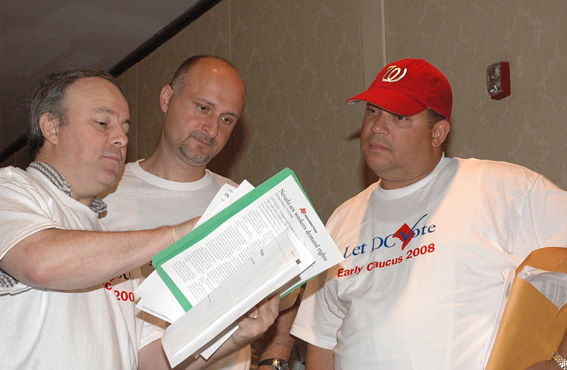Beltway
Happenings ...2
of 6 >
Ilir Zherka: We're here to impress up on the Bylaws Committee
members that they should choose DC as the second caucus in the presidential
contest, principally to achieve two purposes. One is to highlight
urban issues which are critical for millions and millions of people around
the country. And then second is to draw attention to DC's lack of
democracy, its lack of voting representation in Congress. And for
those two reasons clearly the District ought to go second. We also
think that New Hampshire has a point when it says that it has been the
first primary and ought to remain the first primary. We're actually
one of the contestants for an early caucus that back the New Hampshire
primary, so we think--have the first caucus be Iowa, New Hampshire ought
to be the first primary but let DC go second as a caucus leading up to
the primary. So we're not a threat to New Hampshire in that respect.
Democracy in Action: Nevada seems to be the frontrunner in this.
Ilir Zherka: Well certainly that's what we're hearing that Nevada
and Arizona are frontrunners and there are good reasons why they would
be considered frontrunners and we understand the desire of Democrats to
reach out to those communities out in the Southwest and to win those states;
they're critical states. But at the same time the nation's capital
is a special place with very unique problems and most Americans don't understand
what the problems are here. Seventy-eight percent of Americans believe
that Washingtonians have full voting representation. Of course it's
not true. And then you've got the problem of New Hampshire.
New Hampshire has indicated that it will consider moving its primary up
no matter what happens if it's any other state, so that's a very significant
problem for the Democratic Party. While Nevada and Arizona are of
interest, we think that the District solves a lot of problems without creating
new ones.
Democracy in Action: You have an agreement with New Hampshire
or an understanding with New Hampshire?
Ilir Zherka: Well I think we have an understanding with some
people in New Hampshire. We're hoping that that understanding will
draw more people in.
Democracy in Action: What is that?
Ilir Zherka: Well that New Hampshire ought to be the first primary
and we ought to be the second caucus.
Democracy in Action: Why do they want that?
Ilir Zherka: Well I think New Hampshire's law was written to
ensure that it be the first state and the District is not a state.
| Copyright
© 2006 Eric M. Appleman/Democracy in Action |
 |

